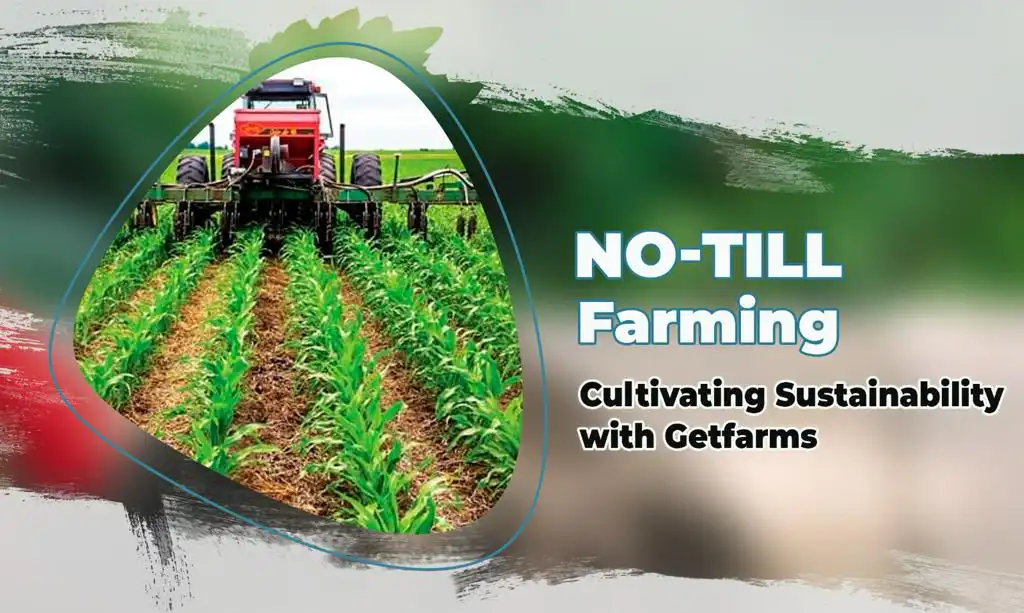No-Till Farming: Cultivating Sustainability with Getfarms

The traditional method of tilling and plowing the land has long been the norm in modern agriculture. However, a ground-breaking strategy known as No-Till farming has gained popularity as the need for environmentally friendly and sustainable agricultural methods is becoming more widely understood.
The Essence of No-Till Farming
No-till farming is a technique that reduces or eliminates soil disturbance, as the name suggests. This method leaves the soil untouched, in contrast to conventional methods that include reworking the soil before planting. The leftovers of the previous crop are directly seeded. Numerous benefits of this method are transforming the face of contemporary agriculture.
Nurturing Soil Health
The favorable effects of no-till farming on soil health are among its main advantages. Traditional plowing of the agriculture farmland has the potential to disturb the soil's fragile structure, resulting in erosion, nutrient loss, and reduced water retention. Contrarily, No-Till farming maintains the soil's natural structure, promoting microbial activity and increasing the amount of organic matter in the soil. The end effect is soil that is healthier and more fruitful and needs fewer outside inputs like pesticides and fertilizers.
agriculture farmland
Erosion damages arable land and causes topsoil loss, which is a concern for agriculture on a global scale. This risk is considerably reduced by no-till farming since the crop residue acts as a cover for the soil. The soil is kept together by the roots of the previous crop and is therefore less likely to be swept away by wind or rain. This protects the priceless topsoil, which is necessary for continued agricultural productivity.
Efficient Water Management
No-till farming offers an environmentally friendly alternative in a time of increasing water constraint. There is less need for heavy watering when the soil is left undisturbed since it stores moisture more effectively. According to studies, conventionally tilled crops use up to 30% more water than no-till fields. As a result, it is a water-efficient agricultural technique that supports current sustainability objectives.
Climate Change Mitigation
Because of the release of carbon dioxide from disturbed soil, conventional farming methods are notorious for making a sizable contribution to greenhouse gas emissions. Because no-till farming preserves stored carbon and leaves the soil undisturbed, it significantly reduces carbon emissions. This helps to mitigate climate change and promotes agriculture as an environmentally responsible industry.
Biodiversity Boost
Farmlands with more biodiversity benefit from no-till farming, which provides a favorable habitat for beneficial insects, earthworms, and microorganisms. It helps natural pest management and contributes to a more robust and sustainable agricultural ecosystem with less pesticide use and a healthier ecosystem.
Getfarms and No-Till Agriculture: Cultivating a Greener Tomorrow
Getfarms is leading the push to revolutionize farming with cutting-edge No-Till farming techniques. Our dedication to sustainable agriculture goes beyond just selling managed farmlands. We have a long history of advancing environmentally friendly agricultural techniques, and we are aware that the future of agriculture lies in approaches that emphasize resource efficiency, soil health, and environmental stewardship. When you work with Getfarms, you have access to knowledge, direction, and a network of farmers who share your commitment to sustainable farming. Together, we can put an end to conventional farming methods and start down a more sustainable, environmentally friendly route that will benefit everyone in the long run.
Embracing a Sustainable Future
No-till farming embodies a dedication to a sustainable future more than merely a farming method. No-till farming offers a ray of hope as agriculture faces serious problems relating to resource scarcity, soil degradation, and climate change. It offers a useful and efficient way to safeguard future generations' access to food while also preserving our environment.
Farmers can start a transforming journey toward sustainable agriculture with the important assistance of groups like Getfarms. By adopting No-Till farming, we promote a more thriving and resilient agriculture industry while simultaneously protecting the environment. It's time to abandon conventional farming methods and move forward on a greener, more sustainable route that will improve everyone's future.
Latest Blog
JOIN OUR COMMUNITY !
Stay connected with Getfarms! Follow us on social media for the latest updates, exclusive offers, and a glimpse into the world of farmhouse living. Join our community today














